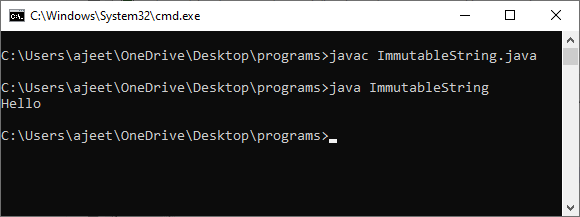Why Are Strings Immutable in Java? Insights right into Memory Performance
Why Are Strings Immutable in Java? Insights right into Memory Performance
Blog Article
Unalterable Strings: A Trick Part in Ensuring Data Uniformity and Integrity
In the realm of information administration, the importance of unalterable strings can not be overstated. The concept of immutable strings goes beyond plain formality; it is a cornerstone in the complicated web of data governance.
The Principle of Immutable Strings
Unalterable strings, a fundamental concept in shows, refer to strings that can not be changed when they are created. Fundamentally, when a string value is appointed, any procedure that appears to modify the string really produces a new string. This immutability makes sure information uniformity and dependability in applications, as it protects against unforeseen changes to the initial data.
Benefits in Information Consistency

Information uniformity is critical in numerous elements of software application advancement, consisting of data source administration, multi-threaded environments, and distributed systems (Why are strings immutable in Java?). Unalterable strings contribute considerably to achieving this consistency by avoiding data corruption due to simultaneous accessibility. In circumstances where numerous procedures or strings connect with the exact same data simultaneously, unalterable strings serve as a protect against race problems and synchronization issues
Additionally, the immutability of strings simplifies debugging and testing processes. With immutable strings, developers can rely on that once a string is established, it will remain the same, making it easier to trace the source of errors and ensuring that examination instances create regular results. This reliability in information managing ultimately results in a lot more robust and stable applications.

Carrying Out Immutable Strings
Guaranteeing the immutability of strings needs a thoughtful method to their execution in software application advancement. When a string object is created, one essential strategy is to make string classes in a way that prevents modifications. By making strings unalterable, programmers can enhance data uniformity and integrity in their applications.
To apply unalterable strings successfully, designers should favor creating brand-new string things as opposed to changing existing ones. This method guarantees that when a string is appointed a value, it can not be transformed. Furthermore, any procedure that appears to change the string must create a new string with the preferred changes rather than modifying the initial.
Moreover, making use of immutable strings can simplify concurrency management in multi-threaded environments. Considering that immutable strings can not be changed after creation, they can be safely shared among multiple strings without the threat of information corruption.
Role in Dependability Assurance
In software program advancement, the usage of immutable strings plays a vital function in ensuring the reliability of information operations. Immutable strings, when produced, can not be changed, making sure that the data they stand for continues to be constant throughout the application's execution. This immutability building offers a degree of guarantee that the information being refined will not be accidentally changed, leading to unexpected end results or mistakes in the system.
By integrating unalterable strings right into software application design, designers can enhance the reliability of their applications by decreasing the risks related to mutable data - use this link Why are strings immutable in Java?. Immutable strings assist in preventing data corruption or unintended adjustments, which can be particularly important when dealing with delicate details or when information integrity is critical
Additionally, the use of immutable strings streamlines simultaneous processing, as numerous strings can safely accessibility and share string data without the danger of one string altering the material while an additional reads it. This element contributes significantly to the overall dependability of the software program system, guaranteeing consistent and predictable habits in data dealing with operations.
Applications and System Integration
The smooth combination of immutable strings right into different applications and systems is essential for ensuring robust data consistency and reliability across diverse technical atmospheres - Why are strings immutable in Java?. Unalterable strings play a crucial function in boosting the stability of information exchanges and interactions within complex software ecological communities. By integrating immutable strings right into applications, developers can mitigate the threats related to data meddling, unapproved alterations, and inadvertent changes, thereby fortifying the total Read Full Article security position of the system
In the context of system assimilation, unalterable strings act as a fundamental element for establishing safe and secure interaction channels and assisting in smooth data transfers between different parts. Their immutable nature guarantees that information sent between systems remains proven and unchanged, minimizing the probability of inconsistencies or mistakes that might compromise the honesty of the entire system. Furthermore, immutable strings can improve interoperability in between disparate systems by offering a standard style for information representation, allowing a lot more efficient data handling and exchange procedures across interconnected platforms. By adopting immutable strings in applications and system integration procedures, organizations can fortify their information facilities and promote the integrity and consistency of their details properties.
Conclusion
To conclude, unalterable strings play a crucial duty in maintaining information consistency and integrity in different applications and system combinations. By making sure that strings can not be transformed once created, the stability his response of data is protected, minimizing the risk of variances and errors. Carrying out immutable strings can dramatically improve the reliability of systems, ultimately leading to even more dependable and exact information handling.

Report this page